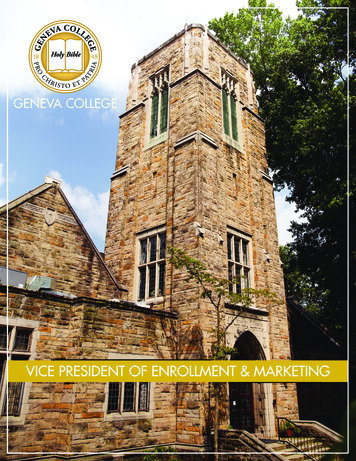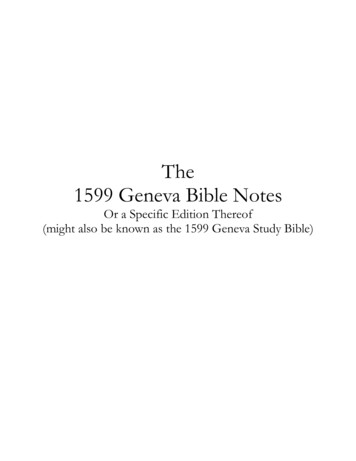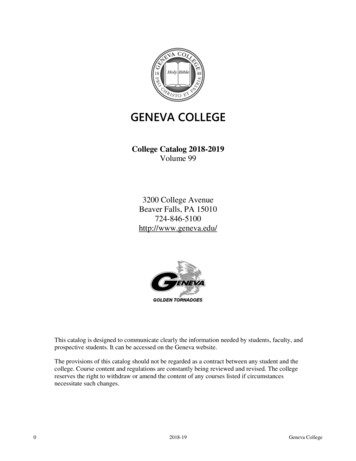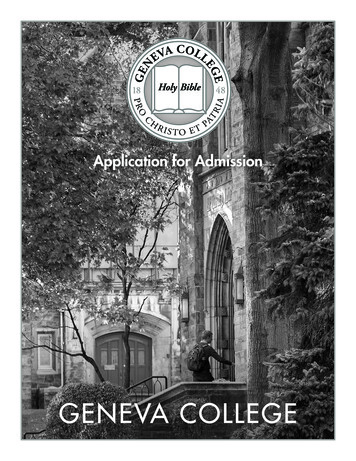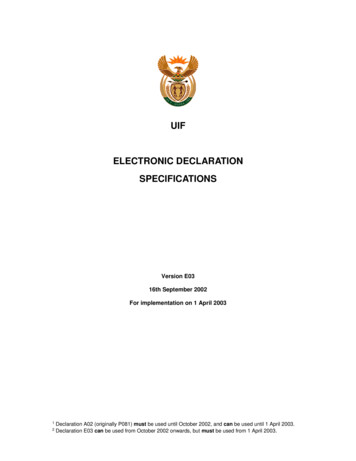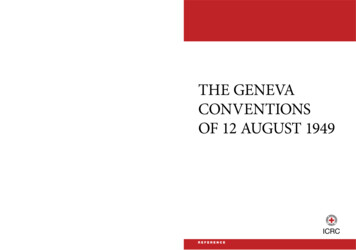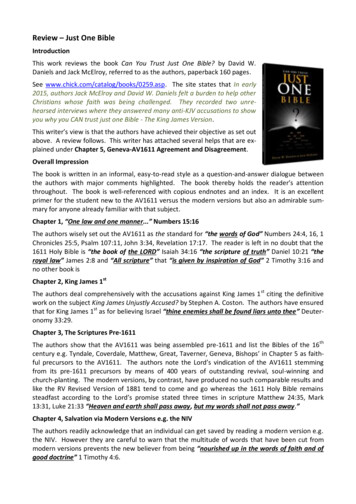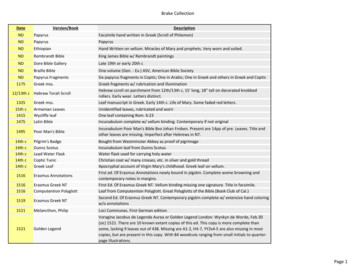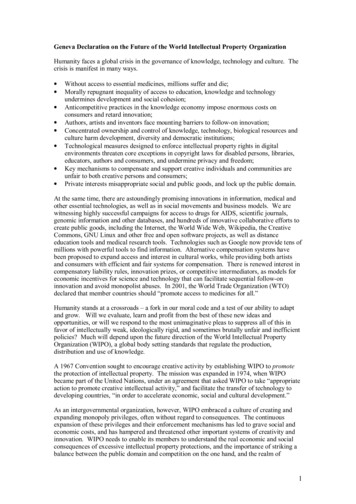
Transcription
Geneva Declaration on the Future of the World Intellectual Property OrganizationHumanity faces a global crisis in the governance of knowledge, technology and culture. Thecrisis is manifest in many ways. Without access to essential medicines, millions suffer and die;Morally repugnant inequality of access to education, knowledge and technologyundermines development and social cohesion;Anticompetitive practices in the knowledge economy impose enormous costs onconsumers and retard innovation;Authors, artists and inventors face mounting barriers to follow-on innovation;Concentrated ownership and control of knowledge, technology, biological resources andculture harm development, diversity and democratic institutions;Technological measures designed to enforce intellectual property rights in digitalenvironments threaten core exceptions in copyright laws for disabled persons, libraries,educators, authors and consumers, and undermine privacy and freedom;Key mechanisms to compensate and support creative individuals and communities areunfair to both creative persons and consumers;Private interests misappropriate social and public goods, and lock up the public domain.At the same time, there are astoundingly promising innovations in information, medical andother essential technologies, as well as in social movements and business models. We arewitnessing highly successful campaigns for access to drugs for AIDS, scientific journals,genomic information and other databases, and hundreds of innovative collaborative efforts tocreate public goods, including the Internet, the World Wide Web, Wikipedia, the CreativeCommons, GNU Linux and other free and open software projects, as well as distanceeducation tools and medical research tools. Technologies such as Google now provide tens ofmillions with powerful tools to find information. Alternative compensation systems havebeen proposed to expand access and interest in cultural works, while providing both artistsand consumers with efficient and fair systems for compensation. There is renewed interest incompensatory liability rules, innovation prizes, or competitive intermediators, as models foreconomic incentives for science and technology that can facilitate sequential follow-oninnovation and avoid monopolist abuses. In 2001, the World Trade Organization (WTO)declared that member countries should “promote access to medicines for all.”Humanity stands at a crossroads – a fork in our moral code and a test of our ability to adaptand grow. Will we evaluate, learn and profit from the best of these new ideas andopportunities, or will we respond to the most unimaginative pleas to suppress all of this infavor of intellectually weak, ideologically rigid, and sometimes brutally unfair and inefficientpolicies? Much will depend upon the future direction of the World Intellectual PropertyOrganization (WIPO), a global body setting standards that regulate the production,distribution and use of knowledge.A 1967 Convention sought to encourage creative activity by establishing WIPO to promotethe protection of intellectual property. The mission was expanded in 1974, when WIPObecame part of the United Nations, under an agreement that asked WIPO to take “appropriateaction to promote creative intellectual activity,” and facilitate the transfer of technology todeveloping countries, “in order to accelerate economic, social and cultural development.”As an intergovernmental organization, however, WIPO embraced a culture of creating andexpanding monopoly privileges, often without regard to consequences. The continuousexpansion of these privileges and their enforcement mechanisms has led to grave social andeconomic costs, and has hampered and threatened other important systems of creativity andinnovation. WIPO needs to enable its members to understand the real economic and socialconsequences of excessive intellectual property protections, and the importance of striking abalance between the public domain and competition on the one hand, and the realm of1
property rights on the other. The mantras that "more is better" or "that less is never good" aredisingenuous and dangerous -- and have greatly compromised the standing of WIPO,especially among experts in intellectual property policy. WIPO must change.We do not ask that WIPO abandon efforts to promote the appropriate protection ofintellectual property, or abandon all efforts to harmonize or improve these laws. But we insistthat WIPO work from the broader framework described in the 1974 agreement with the UN,and take a more balanced and realistic view of the social benefits and costs of intellectualproperty rights as a tool, but not the only tool, for supporting creative intellectual activity.WIPO must also express a more balanced view of the relative benefits of harmonization anddiversity, and seek to impose global conformity only when it truly benefits all of humanity. A“one size fits all” approach that embraces the highest levels of intellectual property protectionfor everyone leads to unjust and burdensome outcomes for countries that are struggling tomeet the most basic needs of their citizens.The WIPO General Assembly has now been asked to establish a development agenda. Theinitial proposal, first put forth by the governments of Argentina and Brazil, would profoundlyrefashion the WIPO agenda toward development and new approaches to support innovationand creativity. This is a long overdue and much needed first step toward a new WIPOmission and work program. It is not perfect. The WIPO Convention should formallyrecognize the need to take into account the “development needs of its Member States,particularly developing countries and least-developed countries,” as has been proposed, butthis does not go far enough. Some have argued that the WIPO should only “promote theprotection of intellectual property,” and not consider, any policies that roll back intellectualproperty claims or protect and enhance the public domain. This limiting view stifles criticalthinking. Better expressions of the mission can be found, including the requirement in the1974 UN/WIPO agreement that WIPO “promote creative intellectual activity and facilitatethe transfer of technology related to industrial property.” The functions of WIPO should notonly be to promote “efficient protection” and “harmonization” of intellectual property laws,but to formally embrace the notions of balance, appropriateness and the stimulation of bothcompetitive and collaborative models of creative activity within national, regional andtransnational systems of innovation.The proposal for a development agenda has created the first real opportunity to debate thefuture of WIPO. It is not only an agenda for developing countries. It is an agenda foreveryone, North and South. It must move forward. All nations and people must join andexpand the debate on the future of WIPO.There must be a moratorium on new treaties and harmonization of standards that expand andstrengthen monopolies and further restrict access to knowledge. For generations WIPO hasresponded primarily to the narrow concerns of powerful publishers, pharmaceuticalmanufacturers, plant breeders and other commercial interests. Recently, WIPO has becomemore open to civil society and public interest groups, and this openness is welcome. ButWIPO must now address the substantive concerns of these groups, such as the protection ofconsumer rights and human rights. Long-neglected concerns of the poor, the sick, thevisually impaired and others must be given priority.The proposed development agenda points in the right direction. By stopping efforts to adoptnew treaties on substantive patent law, broadcasters rights and databases, WIPO will createspace to address far more urgent needs.The proposals for the creation of standing committees and working groups on technologytransfer and development are welcome. WIPO should also consider the creation of one ormore bodies to systematically address the control of anticompetitive practices and theprotection of consumer rights.2
We support the call for a Treaty on Access to Knowledge and Technology. The StandingCommittee on Patents and the Standing Committee on Copyright and Related Rights shouldsolicit views from member countries and the public on elements of such a treaty.The WIPO technical assistance programs must be fundamentally reformed. Developingcountries must have the tools to implement the WTO Doha Declaration on TRIPS and PublicHealth, and “use, to the full” the flexibilities in the TRIPS to “promote access to medicinesfor all.” WIPO must help developing countries address the limitations and exceptions inpatent and copyright laws that are essential for fairness, development and innovation. If theWIPO Secretariat cannot understand the concerns and represent the interests of the poor, theentire technical assistance program should be moved to an independent body that isaccountable to developing countries.Enormous differences in bargaining power lead to unfair outcomes between creativeindividuals and communities (both modern and traditional) and the commercial entities thatsell culture and knowledge goods. WIPO must honor and support creative individuals andcommunities by investigating the nature of relevant unfair business practices, and promotebest practice models and reforms that protect creative individuals and communities in thesesituations, consistent with norms of the relevant communities.Delegations representing the WIPO member states and the WIPO Secretariat have been askedto choose a future. We want a change of direction, new priorities, and better outcomes forhumanity. We cannot wait for another generation. It is time to seize the moment and moveforward.Signing the Geneva Declaration on the Future of WIPO (as of March 4, 2005) Consumers InternationalMédecins Sans Frontières (MSF), Accessto Essential Medicines CampaignInternational Federation of LibraryAssociations and Institutions (IFLA)Martin Khor, Third World NetworkCory Doctorow, European AffairsCoordinator, Electronic FrontierFoundationSir John Sulston, Winner of 2002 NobelPrize for Physiology or Medicine FormerDirector of the Wellcome Trust SangerInstitute, Cambridge, UKBurton Richter, Paul Piggott Professor inthe Physical Sciences, StanfordUniversity, Nobel Laureate, Physics, 1976Michel Rocard, former Prime Minister ofFrance, Member of the EuropeanParliamentPaul A. David, Professor of Economics &Senior Fellow of the Stanford Institute forEconomic Policy Research, StanfordUniversity, Senior Fellow of the OxfordInternet Institute & Professor Emeritus ofEconomics and Economic History,University of Oxford, Emeritus Fellow ofAll Souls College, OxfordPhilippe Aigrain, Founder and CEO,Society for Public Information SpacesGeorge Konrad, former President ofInternational P.E.N. Stéphane Hessel, Ambassador of France,Member, International CollegiumLawrence Lessig, Professor of Law atStanford Law School, Founder of theStanford Center for Internet and Society,Chairman of the Creative CommonsJean Claude Guedon, Professor ofComparative Literature at the Universityof Montreal, CanadaBernt Hugenholtz, Professor of Law,Institute for Information Law, Universityof AmsterdamJerome H. Reichman, Bunyan S. WombleProfessor of Law, Duke University Schoolof Law, Durham, NC USAYochai Benkler, Professor of Law, YaleLaw SchoolWilliam W. Fisher III, Professor, HarvardLaw SchoolJames Love, Consumer Project onTechnologyRishab Aiyer Ghosh, MERIT, Universityof Maastricht, Netherlands.Trans Atlantic Consumer Dialogue(TACD)Celine Charveriat, Oxfam InternationalAlan Cox, Linux ProjectPeter Drahos, Professor and Head ofProgam, Regulatory Institutions Network,Research School of Social Sciences,Canberra, Australia3
Jean Ann Fox and Mark Silbergeld,Consumer Federation of AmericaEd Mierzwinski, Public Interest ResearchGroupFelix Cohen, Director, Consumentenbond,the Dutch Consumers' AssociationBenedicte Federspiel, The ConsumerCouncil, Denmark.Spring Gombe, Health ActionInternational (HAI)Roman Macaya, Ph.D., ExecutiveDirector, National Chamber of GenericProducts, Costa RicaProfessor Michael Geist, Canada ResearchChair in Internet and E-commerce Law,University of Ottawa, Faculty of LawCliff Bamford, Retired Senior Architectfor Internet Operations at MicrosoftIstvan Rev, Central European Universityand Open Society InstitutePamela Samuelson, Chancellor's Professorof Law and Information Management,University of California at BerkeleyJulie E. Cohen, Professor of Law,Georgetown University Law CenterJohn Howkins, Director, IP CharterDamien Cirotteau, Media Innovation Unit,Firenze Tecnologia, Firenze, ItalyRobin Gross, IP Justice ExecutiveDirectorDr Tim Hubbard, Head of HumanGenome Analysis, Wellcome Trust SangerInstitute, Cambridge, UKDr. Volker Grassmuck, HelmholtzZentrum fuer Kulturtechnik, HumboldtUniversity, Berlin, co-founder ofprivatkopie.netSacha Goldman, Audiovisual Producer,General Secretary, InternationalCollegiumRichard Elliott, Director of LegalResearch & Policy Canadian HIV/AIDSLegal NetworkMr. B.K. Keayla, Convenor, NationalWorking Group on Patent Laws, NewDelhi, IndiaAmerican Library AssociationAmerican Association of Law LibrariesAssociation of Research LibrariesSpecial Libraries AssociationDr Graham Dutfield, Herchel SmithSenior Research Fellow, Queen MaryIntellectual Property Research Institute,Centre for Commercial Law Studies,Queen Mary, University of London, U.K.Mike Godwin, Legal Director, PublicKnowledgeProfessor Kevin Outterson, West VirginiaUniversity College of Law Ken McEldowney, Executive Director,Consumer ActionRobert Weissman, Director, EssentialActionNicola Ballenden, Senior Health PolicyOfficer, Australian Consumers'AssociationPedro de Paranagua Moniz - IDCIDInternational Trade Law and DevelopmentInstitute - BrazilBrian Kahin, Visiting Professor, School ofInformation, Ford School of Public Policyand Department of CommunicationStudies, University of MichiganProfessor Michael H. Davis, ProgressiveIntellectual Property Law Association,Cleveland, OhioDean Baker, Co-Director, the Center forEconomic and Policy ResearchMichelle Munro, Policy and ProgramAdvisor, HIV/AIDS and Health, CARECanadaVille Oksanen, Chairman, ElectronicFrontier FinlandN. H. Israni, Chairman - IPR Committee,Indian Drug Manufacturers' AssociationBruno Berthelet, Bureau d'Etudes enGénie Informatique,HasgardMarko Ulvila, Coalition for Environmentand Development, FinlandVera Franz, Information Program, OpenSociety InstituteDarius Cuplinskas, Information Program,Open Society InstituteVeni Markovski, Chairman of the Board,Internet Society - BulgariaAndreas Dietl, EU Affairs Director,European Digital RightsDaniel de Beer, Researcher, VrijUniversiteit Brussel, BelgiumMarlyn Tadros, Ph.D., Executive Director,Virtual Activism - Center for KnowledgeSocietyEnrique A. Chaparro, IFIP TC11 &Fundacion Via Libre, Buenos Aires,ArgentinaSan Patten, MSc., Community-BasedResearch Coordinator, AlbertaCommunity Council on HIVMartin Olivera, Asociáte a SOLAR!Software Libre ArgentinaMr Chr.A. Alberdingk Thijm, SOLVAdvocatenDeeDee Halleck, Deep Dish SatelliteNetworkAndrea Glorioso, Technical Coordinator,Media Innovation Unit - FirenzeTecnologia (Firenze, Italy)David Vaver, Professor of IntellectualProperty & Information Technology Law,4
University of Oxford; Director, OxfordIntellectual Property Research Centre, StPeter's College, OxfordRichard Neill, Trinity College, CambridgeUniversity, U.K.Richard R. Nelson. George BlumenthalProfessor of International and PublicAffairs, Columbia University, New York,NYAndrew Pam, Chief Scientist, Xanadu.Partner, Glass Wings. Manager, SeriousCybernetics. Board Member, ElectronicFrontiers AustraliaAlberto Cammozzo, on behalf of PLUTOProjectLauren Gelman, Center for Internet andSociety, Stanford Law SchoolYovko Lambrev, Free SoftwareAssociation - BulgariaPhilippa Lawson, Executive Director,Canadian Internet Policy and PublicInterest Clinic (CIPPIC), University ofOttawa, Faculty of LawJaco Aizenman L., Founder, FSC - FreeSoftware ConsortiumDr. Marc Holitscher, Senior Researcher,University of Zurich, InternationalRelations Department, SwitzerlandPeter Suber, Open Access ProjectDirector, Public Knowledge, ResearchProfessor of Philosophy, Earlham CollegeSamuel E. Trosow, Assistant Professor,University of Western OntarioFrannie Wellings, Electronic PrivacyInformation CenterNicola Bernardini, Media Innovation Unit- Firenze TecnologiaMichael Landau, Professor of Law,Director, Intellectual Property Program,Georgia State UniversityAidan Hollis, Associate Professor,Department of Economics,University ofCalgaryDr Guido Westkamp LL.M., SeniorLecturer in Intellectual Property, QueenMary Intellectual Property ResearchInstitute, LondonMalla Pollack, Visiting AssociateProfessor, Univ. of Idaho, College of LawMark Davison, Associate Professor MarkDavison, Faculty of Law, MonashUniversityDave Burstein, Chair Fast Net FuturesConference, Special Correspondent,WBAI-FM 99.5Maria Amelia Viteri-Burbano, AmericanUniversityTaran Rampersad, Editor, Linux GazetteRobin Koshy, Centre for Trade andDevelopment, New Delhi Kathy Bowrey, Faculty of Law,University of NSW, AustraliaDr Ian Brown, University College Londonand President, European Digital RightsChandrakant Patel, GenevaRepresentative, SEATINIDr. Rainer Kuhlen, Department ofComputer and InformationScience,University of KonstanzDr. Simon Moores, Director,Zentelligence Research, Ltd.Roopa Rathnam, Oxfam GB, IndiaDinyar Godrej, Co-editor, NewInternationalist, Rotterdam, TheNetherlandsDr Markus Kuhn, Lecturer, ComputerLaboratory, University of Cambridge, UKFrancis Norton, Author and Developer,Norton Online PublishingCharles Medawar, Social Audit LtdGazanfer Aksakoglu, Member HAI,Professor and Head, Department ofCommunity Medicine, Dokuz EylulUniversity, Izmir, TurkeyDr Andrew Herxheimer, Co-founder,DIPEx, Emeritus Fellow, UK CochraneCentreMarco Cappato, former MEP, ExecutiveDirector of Associazione Luca Coscionifor freedom of scientific researchDouwe Korff, Professor of InternationalLaw, London Metropolitan University,London (UK)Rik van Riel, Red Hat, IncShanthi Pal, Essential Drugs andMedicines Policy, World HealthOrganizationProfessor Brook K. Baker, NortheasternU. School of LawMichael Teimman, Chief TechnologyOfficer, Red HatPatrick Nielsen Hayden, Senior Editor,Tor BooksPeterson Maina, Chairman, Circuits &Packets CommunityDuncan Stewart Linedata Services,Inc.,MassachusettsHugh Hancock, Artistic Director, StrangeCompanyNeil Gorman - Sr. Executive Assistant Ethical Technologies,IllinoisMichael L. Love Ph.D, Department ofBiophysics and Biophysical Chemistry,School of Medicine, Johns HopkinsUniversityClaudia Koltzenburg, M.A.,Projektmanagement DFG-Projekt GAP German Academic PublishersChun Eung Hwi, General Secretary,PeaceNet5
Cormac Russell, Producer/GameDesigner, 1Up StudiosMark C. Langston, Sr. Unix SysAdmin,GOSSiP ProjectAsomiddin Atoev, Consultant, PublicFund Civil Initiative on Policy of Internet,TajikistanKhalil Elouardighi, ACT UP-ParisDr Matthew Rimmer, Faculty of Law,ANU, AustraliaComputer Professionals for SocialResponsibilityJonathan Weinberg, Professor of Law,Wayne State UniversityProf. Dr.F.W. Grosheide, MolengraaffInstitute for Private Law, Center forIntellectual Property Law (CIER), UtrechtUniversityNils Philippsen, Software Developer, RedHat GmbH, GermanyJeremy Hunsinger, Center for DigitalDiscourse and Culture, Virginia TechMarjut Salokannel, LL.D. Director,Academy of Finland ProjectSasha Costanza-Chock, Free Press GlobalCommunication ProjectJeff Kuntzman, M.L.S., Internet Librarian,Denison Memorial Library, University ofColorado at Denver and Health SciencesChris Evich, Associate TechnicalEngineer, Red HatStephen M. Maurer, Lecturer, GoldmanSchool of Public Policy, University ofCalifornia at BerkeleyPhilippa Saunders, Essential DrugsProject, LondonRobert Virkus, Enough Software,GermanyJonathan Tasini, President Emeritus,National Writers Union, UAW Local 1981Asociación de linuxeros de CórdobaCórdoba, Spain, www.linuxcordoba.orgTomislav Medak, Multimedia Institutem,Zagreb, Croatia.Alvaro Villalobos Jugo, DirectorEjecutivo, ADIFAN-Asociación deIndustrias Farmacéuticas de Origen yCapital Nacionales, PeruJoão Miguel Neves, ANSOL - AssociaçãoNacional para o Software Livre, PortugalJeremy Douglass, University ofCalifornia, Santa Barbara, United StatesBoatema Boateng, Department ofCommunication, University of California,San Diego, CaliforniaCarla Hesse, Professor of History,University of California, BerkeleyBernard Hugueney, computer scienceengineer, teacher and research scientist,France Sally Burch, Executive Director, ALAI,EcuadorOsvaldo León, President, ALAI, EcuadorEduardo Tamayo, ALAI, EcuadorSerafín Ilvay, ALAI, EcuadorGraham Greenleaf, Professor of Law,University of New South Wales, Sydney,AustraliaHarold L. Burstyn, Patent Attorney andAdjunct Professor, L. C. Smith College ofEngineering & Computer Science,Syracuse UniversityDipl. Psych. Peter Pirron, Mannheim,Federal Republik of GermanyJames Governor, Principal Analyst,RedMonk, LLCJavier Perez, Independent IT ConsultantMartin Svoboda, Director, State TechnicalLibrary, Prague, CzechiaEric Mueller Systementwicklung/SystemDevelopment, Gustavsburg, GermanyMarkus Beckedahl, Chairman ofNetzwerk Neue Medien e.V. (NetworkNew Media), GermanyRoger J. Weeks, Systems & NetworkAdministrator, Mendocino CommunityNetworkChristof Wolf, independent filmmaker,GermanyPaula Graham Consultant, alt synergy,LondonJefferson Berlin, Vice President, SD&ATeleservices, Inc., ElSegundo, CARui Soares, Consultant, Lisbon - PortugalWolfgang Draxinger, lead programmer DARKSTARgames, Munich, GermanyGerald Wilhelm, Software Developer,Berlin, GermanyDaniel Jacober, Unix System Engineer,SwitzerlandDr. Jens Eickhoff, EADS Astrium,Friedrichshafen, GermanyRainer Kuißl, Nuremburg, Germany, ITProfessionalMichael Kassnel, software developer,GermanyJeff Snyder, composer, New YorkBrian Scott, Professor, California StateUniversity NorthridgeJulia & Tarik Banzi, Al-AndalusLarisa Mann, University of California atBerkeleyHugh Stimson, Intern, SmithsonianConservation Research CenterJohannes Lechner, IT Project Managerand Consultant, GermanyDr. Thomas Bliesener, Mélix Especialistas en Software Libre, México6
Beth Burrows, President, The EdmondsInstitute, Edmonds, WashingtonJed Cousin, Technical Director, AtomicXR, Inc. St. Cloud, MNRomain FARAUT, IT & FinancialSpecialistDr. Tigran Zargaryan, Yerevan StateUniversity Library, Head ofAutomationDepartmentPedro Mendizábal Simonetti, President,CPSR-PerúMisha Verbitsky, EPSRC AdvancedFellow. Glasgow University, MathDepartmentBernd Schrader Systemadministration,GermanyFrank Warmerdam, GeospatialProgrammer, Ontario, CanadaLenore Coral, Chair, Music LibraryAssociation Legislation Committee,Music Library AssociationGuilherme Roschke, George WashingtonUniversity Law SchoolProfessor Manuel B. Graeber, Head,Department of Neuropathology, ImperialCollege London, UKBekir Gur, PhD Student, Utah StateUniversity, USJon Lebkowsky, CEO, PolycotConsulting, L.L.C., Austin, TexasSaif Gangjee, Doctoral Researcher inIntellectual Property Rights, Faculty ofLaw, University of OxfordNick Harvey, Editor, Nilgiri PressSergio Ferraris- Sud Nord Multimedia,Roma ItalyRobyn Briese, CIELStephan Beirer, Dipl.-Phys., TheoreticalBiophysics, Humboldt University, Berlin,GermanyAlexis Grant, MSc -- Speech andLanguage Processing, University ofEdinburghHendrik Belitz, Postgraduate researchfellow, GermanyDr. Guenter Bechly, Staatliches Museumfuer Naturkunde Stuttgart, GermanyBertram (Chip) Bruce, Professor, Library& Information Science, University ofIllinois at Urbana-Champaign, USADipl.-Technoinform. Thorsten Gecks,Lehrstuhl für Angewandte Informatik III(Robotik und Eingebettete Systeme),Universität BayreuthFrank Klomp, CRM Alliance BV,Amsterdam, The NetherlandsAlfred Peters, IT-Architect, Hannover,GermanyJens Ziemann, Red Hat GmbH, Germany Meri Koivusalo, Coalition for Researchand Action for Social Justice and HumanDignity (CRASH), Helsinki, Finland DirkRicken, Institut für AllgemeineNachrichtentechnik, Hanover, GermanyHans Klein, Associate Professor of PublicPolicy, Georgia Institute of TechhnologyUrs P. Thomas MBA, PhD, WebsitePublisher, EcoLomics International,GenevaZack Cerza, New Maintainer with theDebian Project.Julian Jonker, University of Cape TownFaculty of Law, South AfricaMichael Lines, University of Alberta,CanadaRussell McOrmond, Ottawa, Ontario,Canada. Host of digital-copyright.ca andco-coordinator ofGOSLINGcommunity.orgRoger Rohrbach, EcstaticCommunications, San Francisco, CADharmaraju, Programme Manager, OxfamGB, Hyderabad, AP, IndiaMark H. Webbink, Sr. Vice President andDeputy General Counsel - IntellectualProperty, Red Hat, Inc. Raleigh, NCAnna Marie Stirr, Columbia UniversityDepartment of Music, New York, NYAlexandre Oliva, Free SoftwareDeveloper, Red Hat, Inc., BrazilDaniel Phillips, Red Hat Inc.David Woodhouse, Linux kerneldeveloper, Red Hat Inc.Karsten Wade, RHCE, Techical WriterJohn Ellsmore, FACING PAGES,Canterbury VIC, AustraliaAlex Maier, Marketing Assistant EMEA,Red Hat GmbH, Dornach bei MünchenDr. Robert S. Stephenson, E-learningArchitect, Associate Professor, BiologicalSciences, Wayne State University, DetroitMIDr. Michel J. Menou, Consultant inInformation and Knowledge Management,Visiting Professor of Information Policy,City University London, Les Rosiers surLoire, FranceDr. V B LAL, Senior Consultant, IPProject, Indira Gandhi National OpenUniversity (IGNOU), New Delhi (India)Anuranjan Sethi, Law Student, NALSARUniversity of Law, Hyderabad, IndiaNelson Cruz, Editor of PCManias.com,Portugal.Eric E. Johnson, Software Developer,Redwood City, CA, USAJames Deville, Deville Computers andConsulting, Bothell, WA, USA7
Heather Ford, Creative CommonsSouthern AfricaHelena Bendova, librarian of the Institutefor German Studies, Philosophical Facultyof the Charles University in Prague, CzechRepublicIvonne Valeria Muñoz Torres, MCE,Digital & E-Security Rights Management,MéxicoValérie Peugeot, Vecam, FranceMichael Ashburner FRS, Professor ofBiology, University of CambridgeNicolas Cahen, ICT Assessor, CentroCultural Poveda (www.poveda.org ) SantoDomingo, República DominicanaWim Vandevelde, G.A.T. - GrupoPortuguês de Activistas sobre Tratamentosde VIH/SIDA, Lisboa, PortugalSuzanne Hillman, Quality Assurance RedHat, Inc.Carlos Passarelli, BrazilianInterdisciplinary AIDS Association(ABIA), Brazilian Network for PeopleIntegration (REBRIP)Kjetil Kjernsmo, Oslo, NorwayMatthew Davis, RHCE, Red Hat GlobalSupport ServicesPat Goodrich, Student ServicesCoordinator, Virginia Tech GraduateSchool, Blacksburg, VA, USADr Michael Spence, St Catherine'sCollege, University of OxfordOrganisation-Electronic Information forLibraries-eIFL.netDirk Ricken, Institut für AllgemeineNachrichtentechnik, Hannover, GermanyKalyanee Shah, President, SEWA, NepalCouncil of CanadiansDr. Luis Baliarda, Presidente, La CamaraIndustrial de Laboratorios FarmaceuticosArgentinos (CILFA)Mirta Noemi Levis, Secretaria Ejecutiva,La Asociación Latinoamericana deIndustrias Farmaceutica (ALIFAR)Adam J. Goldberg, Consumers UnionKarsten Hopp, Red Hat DeutschlandJens Hardings, Universidad de Chile,ChileAlessandra Nilo, President, GestosSoropositividade, Comunicação e GêneroDiana Andrade, Directora Comunicacióny Proyectos, Intercom - Ecuanex, EcuadorChantal Moukoko, Université de Douala,FranceFlorian Oelmaier, CEO SyTrust GmbH,GermanyGajanan Wakankar, Ambassador (Retired)of India to Jordan, INDIAGino Cintolesi Brill, Barcelona, Espana Kay E. Vandergrift, Professor Emerita,School of Communication, Informationand Library Studies, Rutgers UniversityGabriela Giacomini, independiente,ARGENTINAJane Anne Hannigan, Professor Emeritia,Columbia University, New YorkSharon McQueen, Lecturer and DoctoralCandidate, School of Library andInformation Studies, University ofWisconsin - MadisonMarimuthu Nadason, President, ERAConsumer MalaysiaJohn Lozier, Executive Director, Harpingfor Harmony Foundation, Morgantown,WVTill Westermayer, Netzwerk Neue Mediene.V., GermanyBjoern Fay, Mathematisches Institut,Justus Liebig-Universitaet Giessen,GermanyComedia - the Swiss media unionMarleen Stikker, Director, Waag Society /for old and nieuw media, AmsterdamPaul Keller, Head Public Research, WaagSociety / for old an nieuw media,AmsterdamGuillaume Coté , ingénieur eninformatique, Paris, FranceBejon Misra, Chairman, ConsumerCoordination Council (CCC) , Delhi, IndiaNicolas Taffin, C&F editions, FranceJuan Gabriel López Guix, University ofBarcelonaOlga Drossou, Heinrich Böll Foundation,BerlinJin Kien, Tan, Southeast Asian Councilfor Food Security and Fair Trade(SEACON)Emilija Banionyte, Lithuanian ResearchLibrary Consortium, PresidentSusan Nevelow Mart, ReferenceLibrarian, University of California Hastings College of the LawAlexander G.D. van der Wolk,Amsterdam, the NetherlandsKARLA PRUDENCIO IMAÑA, LegalAssistant, Sorvill, Patent and trademarkConsultants , La Paz, BoliviaAndrea Ines Palomeque Liendo,Consultora Propiedad Inrtelectual, La Paz- BoliviaErika Dueñas, Lic en RelacionesInternacionales, Gerente Ejecutiva de laCámara de la Industria FarmacéuticaBoliviana, La Paz - BoliviaM.Angélica Sánchez Vogel,Vicepresidenta Ejecutiva, AsociaciónIndustrial de Laboratorios FarmacéuticosChilenos, Asilfa A.G.8
Eric J. Iversen, NIFU STEP center forinnovation research: Oslo, NorwayDaille Pettit, Acquisitions/CollectionsLibrarian, James Madison University,Harrisonburg, VAMauro Guarinieri, Chair, Board ofDirectors, European AIDS TreatmentGroupKetevan Lapachi, PhD, Tbilisi, Georgia,Co-Founder of Association forCompetition
communities by investigating the nature of relevant unfair business practices, and promote best practice models and reforms that protect creative individuals and communities in these situations, consistent with norms of the relevant communities. Delegations representing the WIPO member states and the WIPO Secretariat have been asked


